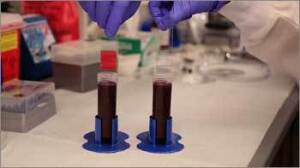by
Lauren Dubinsky, Senior Reporter | October 14, 2014

Blood sticks to the
untreated slide (left)
but the slide treated
with TLP is clear
Courtesy of Harvard's
Wyss Institute
To combat blood clotting caused by implanted medical devices, physicians have commonly used blood thinners, but they can cause serious side effects. However, recently, a team of scientists and engineers at Harvard's Wyss Institute have developed a surface coating for medical devices that can repel blood from over 20 medical surfaces.
"One of the major, long-standing problems in clinical medicine is blood coagulation when devices are implanted and in contact with blood," Dr. Don Ingber, founding director of Harvard's Wyss Institute for Biologically Inspired Engineering and senior author of the study, said in a video.
The team got the idea from a surface technology developed by Joanna Aizenberg, co-author of the study, called Slippery Liquid-Infused Porous Surfaces (SLIPS). It was influenced by the slippery surface of the carnivorous pitcher plant, which allows it to trap insects.



Ad Statistics
Times Displayed: 365596
Times Visited: 7067 Quality remanufactured Certified Centrifuges at Great prices! Fully warranted and backed by a company you can trust! Call or click for a free quote today! www.Centrifugestore.com 800-457-7576
The SLIPS technology was originally used to prevent ice from sticking to airplane wings or oil from sticking to pipelines, but the team wanted to bring that concept to the medical world.
To develop the coating, the team chemically attached a monolayer of perfluorocarbon and added a layer of liquid perfluorocarbon, which is commonly used for applications such as blood substitution, eye surgery and liquid ventilation for infants with breathing difficulties. The team refers to the combined perfluorocarbon and liquid layer as Tethered-Liquid Perfluorocarbon surface (TLP).
They tested TLP on over 20 different medical surfaces that have already received FDA approved including plastics, glass and metal and found that it can effectively repel blood and also prevent biofilm from forming.
They tested TLP on pigs and found that for over eight hours it can prevent blood clots under fairly high blood flow rates without using the blood thinner, heparin. They also performed an experiment with a gecko, known for its adhesive footpads, in which they put it on a surface treated with TLP and found that it could not hold on.
Additionally, when bacteria called Pseudomonas aeruginosa was grown in a tube coated with TLP for over six weeks, less than one in a billion of the bacteria were able to adhere to the tube. The team also coated central lines with TLP and found that it can greatly reduce sepsis from central-line mediated bloodstream infections.
So far they have only tested the coating on devices such as catheters and perfusion tubing, but they hope to test it on dialysis machines and extracorporeal membrane oxygenation machines in the future. "We feel this is just the beginning of how we might test this for use in the clinic," Daniel Leslie, scientists at the institute and co-lead author of the study, said in a statement.
Back to HCB News

